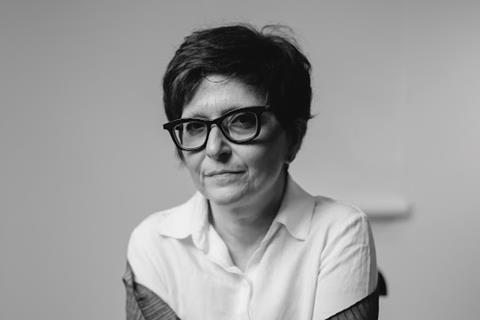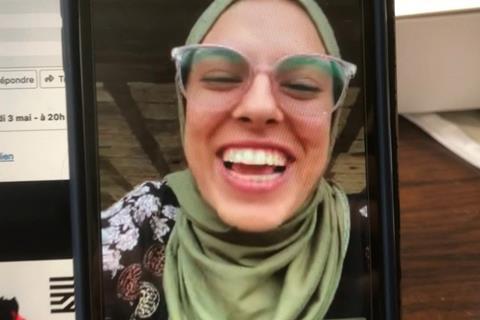
Iranian filmmaker’s Sepideh Farsi’s documentary Put Your Soul On Your Hand And Walk tells the story of Fatma Hassona, a 25-year-old photojournalist living under siege in Gaza through a year-long series of video calls and message exchanges with Farsi, starting in April 2024.
Their conversations range from Hassona discussing the horrific killings of friends and family members, to her dreams of one day leaving Gaza to explore the world, and films and books they each loved including Frank Darabont’s Shawshank Redemption and Virginia Wolf’s A Room Of One’s Own.
The day after the film’s selection for the Cannes ACID sidebar was announced, on April 16 2025, Hassona and most remaining members of her family were killed by the Israeli Defence Forces (IDF). Her mother survived.
Farsi, speaking ahead of the film’s screening at the Edinburgh International Film Festival on August 22, says she has complex feelings watching the film now. “It’s very difficult, but it’s also very joyful. It’s as though she were still alive,” she says.
”When I see her on the screen, there’s always a moment of joy. I remember all that we went through, and she’s so lively. She breaks out of the screen. And then it all hits me again.”
Put Your Soul On Your Hand And Walk - the title is from an observation Hassona makes in the film - began for Farsi as a compulsion to make sense of events that unfolded after the October 7, 2023 attacks by Hamas in Israel that saw Palestinian militants murder over 1,200 people, two-thirds of them civilians, and kidnap and take hostage a further 200 Israeli civilians and soldiers. It provoked a military response from Israel that has killed more than 56,000 people, many of them civilians, in Gaza to date.
“I needed an answer to some questions, and I needed to find that Palestinian voice,” says Farsi. “It reached me to a level and an extent that it made my life impossible without reacting.”

Farsi, who is based in Paris and Athens, was imprisoned in Iran at 16 as a dissident, left aged 18 and has directed films including Tehran Without Authorisation (Locarno, 2009), Red Rose (Toronto, 2014) and animation The Siren (Berlinale, 2023).
She was adamant the film needed to be told through the eyes of someone living in Gaza, and travelled to Cairo to try and figure out a way in, with no funding in place to make a film. When getting into Gaza proved impossible, a friend put Farsi in touch with Hassona, a photojournalist and poet in Gaza, and a year-long series of video calls and message exchanges began, starting in April 2024.
Farsi also produces the project alongside her long-standing collaborator Javad Djavahery at Paris-based Rêves d’Eau Productions, who provided funding for the film, and co-produced by Annie Ohayon Dekel of 24images Production. The film took part in Visions du Réel’s 2025 work-in-progress showcase. Dubai-based Cercamon boarded as sales agent after it was selected for Cannes.
“The first months post October 7, the trauma and everything, all that we heard was other voices about Palestinians. I know [what it’s like] as an Iranian, other people talking about us without asking us what we feel.”
She ended up with around 100 hours of footage of conversations between them. Their final conversation took place the day before Hassona was killed. “I didn’t want to include [the final conversation] at first, but practically a week before the [Cannes] premiere I changed my mind, I thought it was important for people to see her last moments with me.”
Investigative group Forensic Architecture, based out of London’s Goldsmiths’ University, studied the missile attack and published a report a month after Hassona’s death, stating she was specifically targeted by the IDF, owing to her work as a photojournalist.
Farsi agrees. Since October 7, at least 240 journalists and media workers have been killed in Gaza, according to the United Nations.
“It would be useful for Israelis to see it”
The film has sold widely for Cercamon, including to Dogwoof in UK-Ireland, Kino Lorber in the US, and Front Row Entertainment in the Middle East. It will next screen at the Toronto International Film Festival in September. Farsi would like to see it shown in Israel – if the people of Palestine can see it too.
“It would be useful for Israelis to see it too. I don’t know of any clear plans. There were a couple of invitations to festivals in Israel, but I don’t know what happened. If the film was going to be shown in Israel, [it should happen] only if it is being shown in Gaza and the West Bank in Palestine as well. Palestinians have a right to see it.”
A book of Hassona’s work is being published in September when the film is released in France by New Story, and partially based on the dialogues of the film. Farsi also organises exhibitions of Hassona’s work around the world.
Although Farsi has other projects in the works include a biopic of two Iranian women and their friendship, based on real events that span half a century, and an animation project based on her own life, Memoirs Of An Undutiful Girl, she is finding it hard to move on from Hassona and Put Your Hand On Your Soul And Walk.
“I’m not the same person anymore,” she says of how the experience has changed her. “It’s just so intense, I feel even more responsible, involved and impacted by Gaza generally and her loss, and all that happened to her and her family. Everything I do is revolving around this thing. Everybody who sees it also relates to it. It’s a very impacting film – people write to me, want to help, want to meet me, want to make things change, want to do things about her, with me, without me, it’s huge.
“Writing anything else that is not about Gaza seems impossible right now. Every time I make an attempt, it just hits the wall.”















![[L-R]: Amanda Villavieja, Laia Casanovas, Yasmina Praderas](https://d1nslcd7m2225b.cloudfront.net/Pictures/274x183/6/4/1/1471641_pxl_20251224_103354743_618426_crop.jpg)








![[L-R]: Amanda Villavieja, Laia Casanovas, Yasmina Praderas](https://d1nslcd7m2225b.cloudfront.net/Pictures/100x67/6/4/1/1471641_pxl_20251224_103354743_618426_crop.jpg)
No comments yet